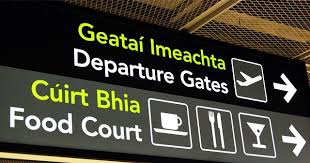A Course in Translation!
My wife Sinéad and I recently spent a week in the Donegal Gaeltacht and we both had a great time. We attended courses organised by Oideas Gael in Glencolmcille - Sinéad on a course with an emphasis on spoken Irish and myself on a course in translation. Sinéad really liked the course she attended, and she improved her spoken Irish. I had never done a course in translation before, so I had no idea what I was walking into.
I was taken aback
I thought I already had the basic translation skills and would polish them in this class. I was soon taken aback. First, the teacher asked us to translate phrases or sentences from English into Irish. I did as he asked and then the problems just started. For example, we had to translate 'Mixed Doubles' (in tennis) into Irish. I went into Foclóir.ie and the translation I got is ‘cluiche dúbailte measctha’. We all had that same translation (five of us) in the class. We thought we'd quickly move on to the next phrase. A few hours later we were still chatting about that translation. Doctor Micheál Ó Duibh was teaching us a master class - there is no doubt about that. Micheál used this example and a few others too, to let us know the difficulties involved in translation. What happened during the time we were discussing 'Mixed Doubles'?
Master Class
We trust the dictionaries we use in translation. That's not always a good thing, and it's worth thinking first about what's behind the English version. It is also worth imagining that you are explaining English from Irish to someone who does not speak English. Also, the dictionary does not have to conform to the official Standard. You may not think so, but there are situations where it is necessary for you to comply with the official Standard in order to meet the terms of your contract. After all, you have options all the time when translating.
Micheál took us through the process, step by step. As an introduction, he said that there was more than one way to translate, and that he would show us his own way. His process is as follows.
Before translating 'mixed doubles', how about 'doubles'? We suggested a ‘dúbailte' to him. ‘Dúbailte’ can be used he said, but is there a better way to translate it into Irish? Don't you think there are only two people playing with the word 'dúbailte'? Is it right to use ‘dúbailte’ when referring to people? We didn't have the answers. He proposed 'cluiche beirteanna' as a translation of 'doubles', and 'cluiche beirteanna na bhfear', 'cluiche beirteanna na mban' and 'cluiche beirteanna measctha' as translations for 'men's doubles', 'women's doubles' and 'mixed doubles'. I have to say that those translations are much better, in my opinion, than what is in the dictionary. Micheál made translations of the meaning of the phrases, instead of a bare translation of the words themselves. That approach raises the quality of the translation significantly. That's just one example, but it gives you a taste of what's involved when you translate.
Sometimes, there is a phrase that is not clear how to translate, and you have to state the options and then think to pick the right one. For example: 'Irish Music Month 2024'. It can be given the following translations: ‘Mí Cheol na nÉireannach 2024’, ‘Mí Cheol na hÉireann 2024’, ‘Mí Cheol Éireannach 2024’, agus ‘Mí Ceoil Éireannaigh 2024’. The biggest problem with that is that the English version is ambiguous. For example, 'Irish' can be used to refer to someone from Ireland or something from Ireland. And it can be 'Irish Music' month', or 'Irish 'Music month'' and they are not the same. In Irish, each meaning has a different translation. We thought ‘Mí Cheol na hÉireann 2024’ was the best translation and what was meant in the original English version.
Practice makes perfect
We had a lot of exercises to do in class, and we spent most of the time practicing the craft of translation. We had to translate all kinds of passages, from official paragraphs from government documents to informal speeches by politicians, from road signs to passages from novels. We shared our efforts with the other students in the class, and they wrote suggestions on them. In this way, we received very useful feedback and we were learning and improving our skills all the time.
After that, Micheál said that it is very difficult to translate famous quotations. He gave us a difficult one, written by George Bernard Shaw: 'Dancing is a perpendicular expression of a horizontal desire'. I thought about it, and I noticed a few things. Firstly, the words 'perpendicular' and 'horizontal' work well in English, but it would be quite difficult to translate them directly into Irish. Secondly, it is a semi-sexual reference and it would not be correct to translate the explanation directly, because then the semi-reference which is central to the statement will be lost. Then, he came to me, and I did my best translation of the course and maybe ever: 'Scaoileann fonn fonn'. There are only three words, but they convey the essence of Shaw's statement. Instead of using geometric patterns, I used wordplay. Fonn means an air or tune, but it also means a wish or desire. You would be able to come up with 'A tune releases desire' as an explanation of the phrase Scaoileann fonn fonn'. I was sure after that translation that I had learned a lot in this great class, and that I am much more confident now to deal with all kinds of translations from now on!






